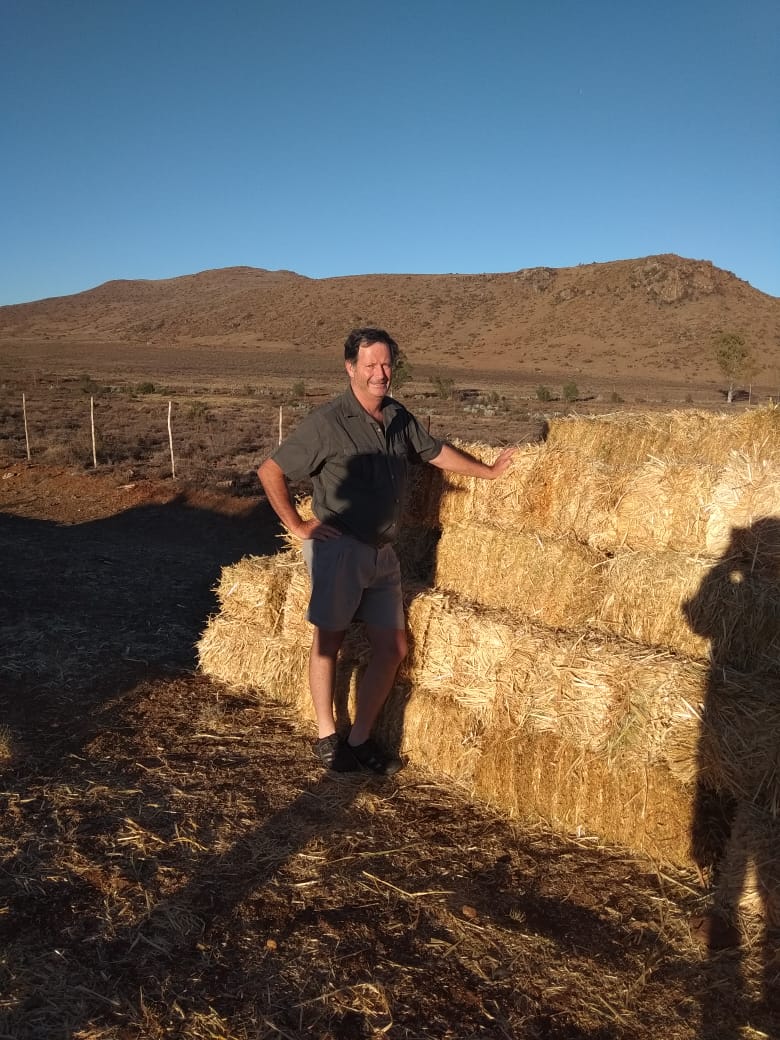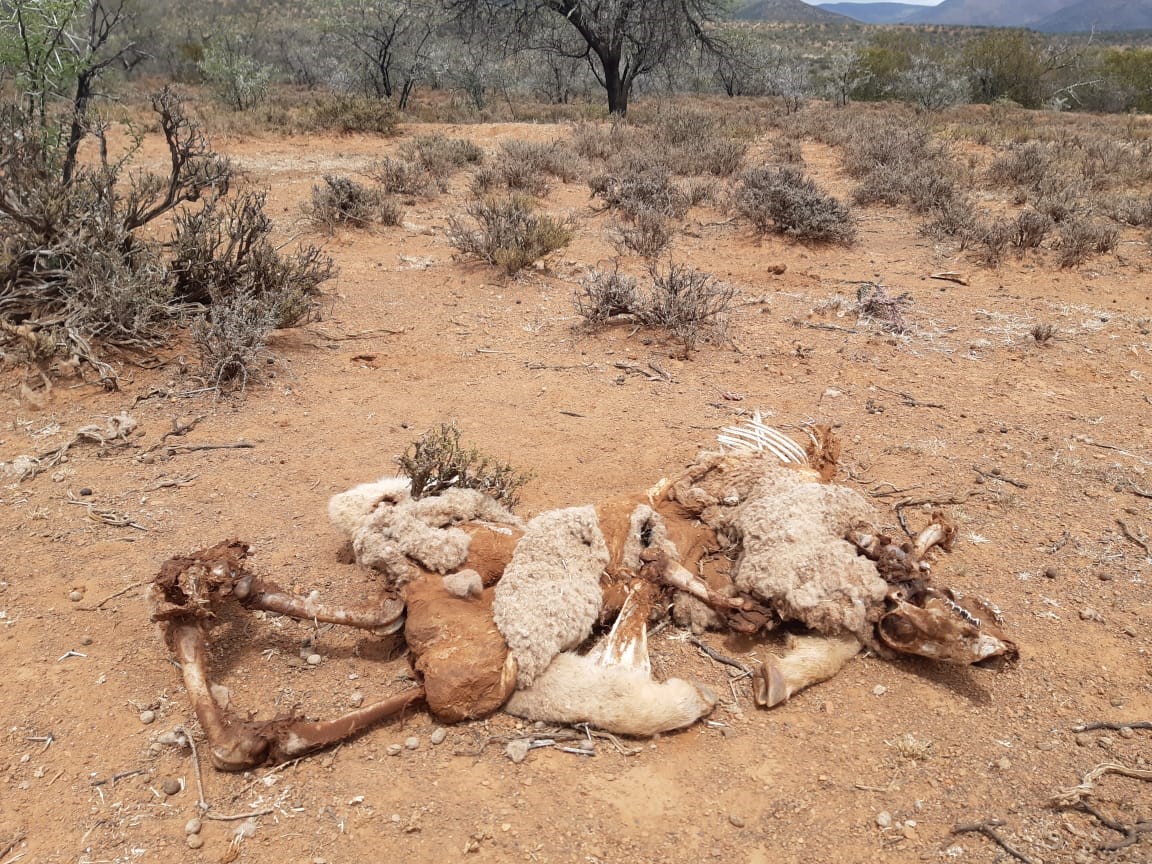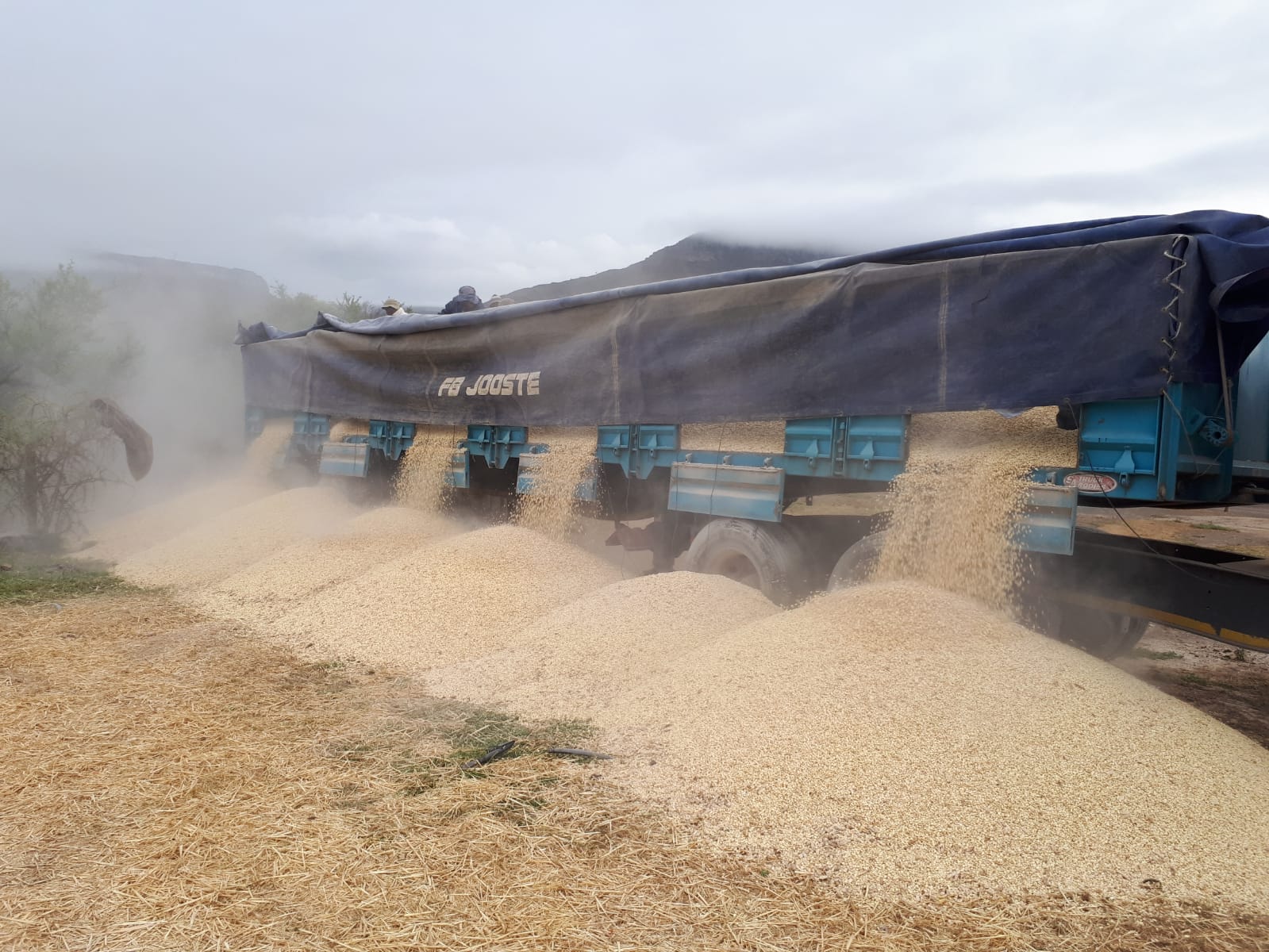The members of the OD Union have very generoulsy donated over R18 000 to the OD farmers trust, which is greatly appreciated. We do however call the network again as this amount is not enough in order to make a substaintial difference.
The farmers have recorded rainfall of 12mm in December, while this does contribute to alleviating the dire situation, they cannnot rely on only this.
Frekkie De Villiers (1994F) kindly drove a truck load of oat hay and lucerne to Grant Paxton (1994F) in December.
 Robert Graaf (1992F) also managed to transport a truck load of oat hay to Roland Kroon (above) (1984W)
Robert Graaf (1992F) also managed to transport a truck load of oat hay to Roland Kroon (above) (1984W)
For anyone wihsing to help these farmers please do not hesitate in donating to the trust below;
Name: Clark Cupido Attorneys Inc
Bank: FNB
Account Number: 62757530897
Swift code: FIRNZAJJ
Ref: DROUGHT RELIEF [your surname]
9 December
Going into the summer of 2016/2017, anxious Capetonians were preparing to queue at designated water-collection points in anticipation of the foretold Day Zero, when the city of Cape Town was due to run out of fresh water.
Day Zero never came.
Since then, there has been a perceived sense of harmony; a sense that the Western Cape – and the rest of South Africa – had beaten the drought. But this is not the case.
Farmers, who form the backbone of South Africa’s food and employment security in rural communities, have been fighting the lack of water and the accompanying effects of the drought for the past seven years.
“At this stage, it would not be necessary to declare a national disaster, but provincially – in the Western Cape, the Eastern Cape, the Northern Cape and Limpopo – a disaster declaration should have come more than a year ago,” said Willem Symington of Agri Northern Cape in an interview with Daily Maverick after a meeting on 12 November.
The meeting was a first of its kind, with members of the farming community coming together at the AgriSA press briefing in Centurion. The agenda focused on discussing the plight of the farming industry, which had been suffering since the drought started seven years ago, according to Daily Maverick.
“It’s been going on for at least six years,” says Grant Paxton (1994F), who farms livestock in the Eastern Cape, near Aberdeen. “Farmers are now throwing money into what has become a bottomless pit, because they need to continually provide feed to their animals.”

Grant Paxton (1944F) says 99% of people only have their core breeding flock left and so they are running at 50% of what they used to run. Photo: Grant Paxton.
Lack of water means lack of feed for the farmers’ livestock.
“In the Eastern Cape, there is often talk of drought relief by the government and by AgriSA,” says Paxton. “However, this money is usually siphoned off to other departments. Farmers in other provinces have offered feed, but it costs an arm and a leg to transport it from Natal, for example, to the Karoo. It’s dearly expensive.”
Decreasing produce prices in foreign markets have worsened the situation, says Kevin van Wyk (2000S), whose sheep farm, Trakaskuilen, is in Beaufort West. “The current drought is the worst in living memory, according to various sources,” he says. “Farmers are battling from a cash-flow perspective, which is made worse by the relatively low meat, wool and mohair prices (the main commodities farmed here).”
Ronald Kroon (1984W), who has been on his cattle farm for 29 years, reiterates this: “According to some archaeological reports, this is the driest this part of the world has been in 1 000 years.”
The drought’s effects on the agricultural sector have a direct effect on employment. “Unemployment in rural areas is rising,” says Paxton. “People are laying off staff, and this will lead to further problems in the communities. If you go hungry, you’re much more likely to break into a house or steal a sheep. It is a matter of survival.”
According to Statistics South Africa, the Eastern Cape has the highest rate of unemployment in terms of the expanded definition – 46% for the third quarter of 2019. Unemployed persons, according to the expanded definition, are those between the ages of 15 and 64 who a) fall under official unemployment (searched and available); and b) were available to work but are discouraged work-seekers, or have other reasons for not searching.
While the government does allocate funds to drought relief, Van Wyk and Paxton indicate that these are not usually used for their intended purpose. “In most provinces, the money gets blown, and the government often has no idea where it goes because there is so much corruption,” says Van Wyk. “It is only in the Western Cape that these funds get allocated properly.”
The drought has been affecting many farmers across South Africa – and most government interventions seem to be failing. “We would appreciate any engagement to try to find ways of alleviating the situation,” says Kroon. “But I suspect this will mostly relate to assistance in getting animals into a marketable condition. I believe assistance that merely keeps animals alive is pointless, as mother nature’s patience will most certainly exceed the capacity of most budgets.”
The idea is to find sustainable ways of helping commercial farmers as the traditional avenues are not working.
From Aberdeen and Beaufort West to Graaff-Reinet, we know of 13 OD farmers currently fighting the drought.
 Roger Sainsbruy (1994F) and Dan Frater (1994F), along with many more, have managed to send Paxton 750 bales of oat hay and 34 tons of white maize from the Free State. This was achieved over a couple of days.
Roger Sainsbruy (1994F) and Dan Frater (1994F), along with many more, have managed to send Paxton 750 bales of oat hay and 34 tons of white maize from the Free State. This was achieved over a couple of days.
As the OD Union, we call on ODs who want to get involved – or who know of anyone able to help these farmers – to get in touch with us. And if you know any other OD farmers in need, contact us at ODUComms@bishops.org.za.
Dan Frater (1994F), among a few others, have already done some exceptional work in setting up a trusts specifically for drought relief as a means to get these farmers through to the new year.
If you, or someone you know can help, please donate into these bank details. The a trust account belongs to an attorney in Paarl ensuring that the funds are safely allocated to the cause. The reference for any donations are; DROUGHT RELIEF [your surname]
Name: Clark Cupido Attorneys Inc
Bank: FNB
Account Number: 62757530897
Swift code: FIRNZAJJ
Ref: DROUGHT RELIEF [your surname]
Please leave your reference and please share this far and wide, as every contribution will help a lot.
Any and all help is greatly appreciated by these farmers during an exceptionally tiring situation.

